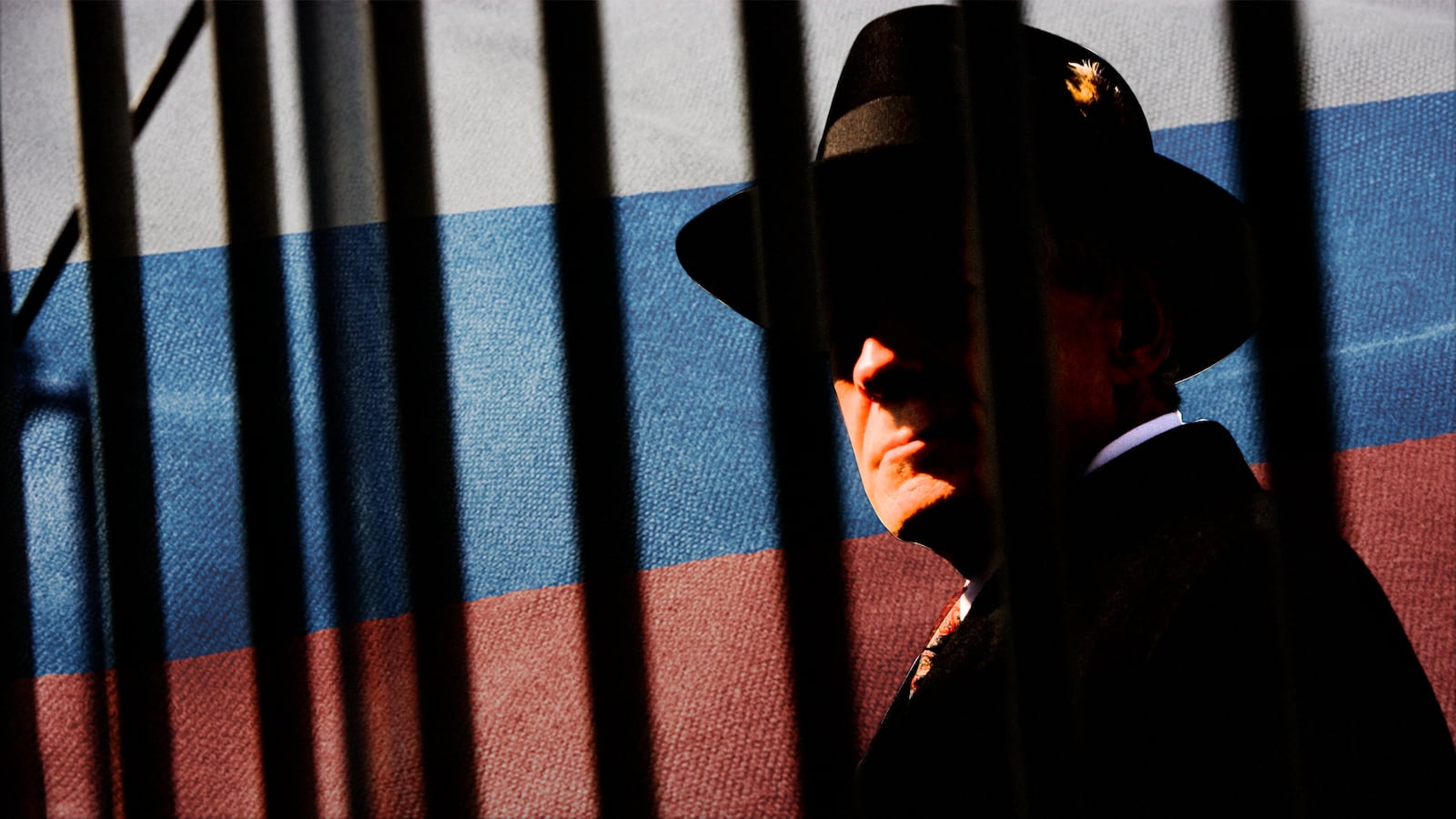Scott Olson spent much of his 21 years as a special agent in the FBI’s counterintelligence division, with posts in New York City, Washington, D.C., and Baghdad. His work at the FBI was recognized through the awards he received: NCIX Counterintelligence Award of Excellence, a NCIX Community Award for Counterintelligence and an ODNI Exceptional Achievement Medal. While the specifics of the awards are still classified I know the details of his ODNI Exceptional Achievement Medal intimately, since it deals with my three years working for Scott and the FBI as a double agent against Russian military intelligence.
The last time I saw Scott was in 2009, when he attended my swearing-in as I received my commission to become an officer in the United States Navy, but we have stayed in touch over the years. With my book, How to Catch a Russian Spy, published, and Scott now retired from the FBI, we were both free to talk about old times—and the role of Russian intelligence in the 2016 elections.
While I don’t always share Scott’s views—lightly edited in the exchange below for space and clarity—they offer a window into how the present moment, and particularly the Russia investigation, looks to a longtime Bureau line agent and then supervisor.
Naveed Jamali: The British have been adamant that Russia was behind the assassination of Sergei Skripal. If that’s so, what was Russia seeking to accomplish?
Scott Olson: Not that Russia’s practice of murdering its own expatriates is anything other than an offense against humanity, but it is not intended as a statement to the U.K. or to the world. It is a statement to its own people, particularly to the professional rank-and-file in the Russian intelligence services. The message is this: Betrayal is death, and neither time nor distance can make you safe. We will go anywhere, risk the censure of the world, and hurt whoever happens to be nearby at the time to kill anyone who has betrayed us.
And this is not a new message. It is a message with its roots from the time of the Cheka and probably before.
N.J.: Should Americans be worried? Should I be worried?
S.O.: This is a message from the Russian government to Russian citizens, especially those working in the Russian intelligence services. Betrayal means death.
You’re not at risk because you never promised loyalty to Russia. In their view you were bought and paid for and therefore already to be disdained. Just like Kim Philby, Guy Burgess, Antony Blunt, etc.
They expected to be rewarded, but they were treated as what the Russians considered them to be: traitors to Russia’s enemies. Russia kills its traitors, not other nation’s.
The only risk to Americans is the injuries seen in the UK first responders and others near the murder scene. That’s another component which adds to the grave nature of this offense against humanity.
N.J.: How would you describe risk in counterintelligence and the willingness of the FBI to take on that risk?
S.O.: Risk management in the FBI is an interesting animal. It depends if you are talking about risk to the mission and the national security to the United States, or risk to your career because you are filing a FISA application, approving an operation or trusting an operational asset. Those two things—risk to the mission and to an agent’s career—can get confused in a hurry.
The line agents and the professional staff think of risk management as seen as risk to the mission. As soon as you get a little ways up, risk management becomes “what do I do to protect my career and to those around me?” Managers are very reluctant to bring up people who don’t have the career safety of those around them as their first priority. If you develop a track record of putting the mission first and career second, you don’t get promoted—because nobody wants to be damaged when an arrest or an operation goes sideways.
N.J.: With has the impact been on the FBI as both the president and many in Congress attack the FBI and its objectivity?
S.O.: For Jim Comey, Andrew McCabe and the less well known executive assistant directors, and also for Peter Strzok, the focus has been on how those attacks harm our careers and the FBI. The focus has not been on asking “what is our mission, and what are we obligated to do as the FBI?”
N.J.: What do you make of McCabe’s firing?
S.O.: Nothing unusual happened to Andy McCabe. It’s not unusual for the FBI’s Office of Personal Responsibility and the DOJ inspector general to scrutinize the behavior of FBI personnel when there is a question about whether they acted appropriately. It’s not unusual for an employee to be dismissed just before their retirement benefits vest. It’s also not unusual for a dismissed employee to plead for time to retire, or for that plea to be rejected as it was for McCabe.
What’s unusual if for it to happen to someone on McCabe’s lever. The “usual” for someone that high up is for action on the case to be delayed long enough to allow him to retire fully vested. That exception action wasn’t done for McCabe. He was treated like a member of the rank-and-file. And that’s the only unusual thing here. Consequently, I don’t see Trump exercising “illegal command influence” because if he was influencing the process here, it was to ensure the improper privilege often accorded senior FBI executives didn’t happen here.
What happened to Andy McCabe is not unusual, and sadly, what Andy McCabe did is not that unusual either. FBI employees usually get fired for lying.
N.J.: Was any of the criticism of the FBI for its handling of the Clinton email server investigation or the Russia investigation warranted?
S.O.: The question that should have been asked is “what would we be doing with these investigations if this wasn’t an election year?” Instead they were focused on protecting the Bureau’s reputation—and that’s where the investigations went off the rails.
N.J.: With today’s news that Bob Mueller is looking at a relationship Robert Gates and Paul Manafort had with a former Russian military officer, might we now start seeing a direct link to Russian intelligence?
S.O.: The facts are similar in significance to a retired CIA case officer doing consulting work. Sure, it's a connection, but the intel services would task active case officers, not retired.
You look at intelligence operations they are designed to either collect intelligence from a foreign government without that government knowing that the intelligence has been taken or to influence a foreign government in a non-public way so that there is no blowback. They require sustained covert operations. None of the behavior I have seen described in the press demonstrates trusted people acting on behalf of Russian intelligence organizations. It shows a flat out-effort political effort.
N.J.: The indictment also specifically mentioned the GRU, which brought back old memories for me since I worked for you against a GRU officer. What should Americans know about the GRU? What is their focus?
S.O.: “GRU” is an acronym which loosely translates as “The Main Intelligence Directorate of the General Staff of the Russian Military.” It’s their DIA.
N.J. What do you think about the meeting at Trump Tower—was it a Russian intelligence operation?
S.O.: Absolutely not. Because a meeting like that if it was an intelligence operation, the important thing would be for that meeting not to be noticed or observed. If you’re going to have a covert meeting, you’re not going to do it at Trump Tower. You go back to some of the tradecraft you were taught as a counterintelligence operational asset—to get into and out of a meeting without being noticed. If any of these Russian assets were being tasked by Russian intelligence to meet with the Trumps, they would have chosen anywhere other than Trump Tower.
N.J.: What’s the difference between the criminal and counterintelligence divisions of the FBI?
S.O.: In criminal matter, generally, you are focused on removing a criminal from the street to significantly curtail their ability to commit crime. In a counterintelligence matter, there are more ways to accomplish the goal removing the person attempting to collect information. For example, we don’t just throw out spies; instead, we often keep a spy in place thinking they are effectively collecting intelligence, when we know that they are not. There are more things that we can do to keep a spy from spying—many of them classified since we don’t want the intelligence agencies of the world to know how we do things—than there are things we can do to stop a criminal.
N.J.: One of the things that always surprised me about dealing with the counterintelligence agents as that many of them had less arrests in their entire career then a New York City cop might have in a year.
S.O.: Federal officers aren’t cops. They have arrest powers, but only for federal offenses. I was in the Bureau for 21 years and never testified in court and never made an arrest. In fact, we can sometimes define the success of our operation by the type of party the Russian spy has when he gets home. At the end of his tour, that intelligence officer will go home and write up a promotion package based on all of the intelligence that person has collected. And if the FBI counterintelligence officer has done has made sure every sentence that has been sent back is not relevant and is not useful, then it is the counterintelligence officer who has succeeded and only he and the U.S. intelligence community knew it.
…
You were very frustrated in your case, because you wanted [GRU Officer] Oleg Kulikov to know he had been had. I consider your case to be a huge success with one major exception: the fact that Oleg went home knowing he had been defeated. The case would have been a bigger success if Oleg was sitting around the fireplace in Russia right now drinking with his old comrades in the GRU and talking about how he kicked the FBI’s ass during his time in New York when the reality is that he didn’t get a damn thing from the U.S.
It takes a unique person to feel genuinely satisfied with his job when his opponent thinks he has won and is having a victory party.






